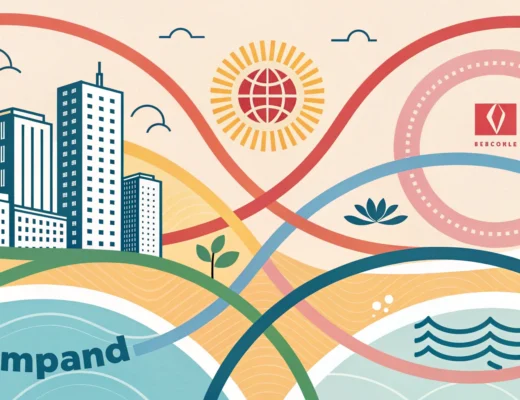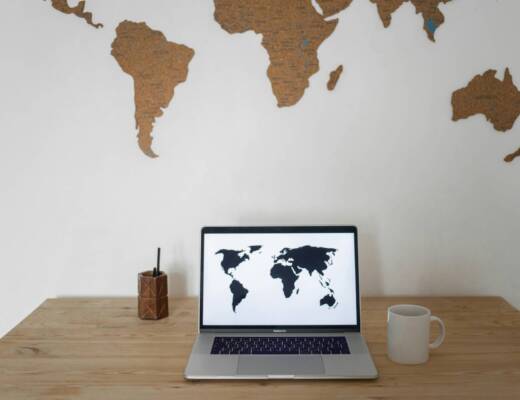You’ve been lied to.
So many books have been written on minimalism, yet it simply doesn’t work for so many people. We all know deep down inside that less possessions doesn’t necessarily lead to a happier life.
Why? We all want more stuff! Depriving yourself makes you feel repressed, guilty for wanting things, and triggers your brain into a scarcity mindset. Minimalism is supposed to be a positive thing, but instead you feel an extreme lack in your life.
Minimalism should allow you to have a richer, fuller life, not make you feel like what you have is insignificant.
Is it possible strive to be “wealthy” or have “abundance” yet not have material possessions, excess, or waste holding us back? What about freeing up mental space and energy? How do I work less and achieve more?
My Personal Story
As long as I can remember I’ve been a minimalist. As a kid I was never allowed to have excess. I grew up in a very frugal family and never took more than I needed. I learned to value minimalism and all through college, I kept possessions to a minimum. On move in day I was always the first one settled in…
Since then, I’ve done the whole travel the world and live out of a backpack for multiple years thing, but deep down inside I’ve always felt a I was lacking something. I never allowed myself to have the things that I wanted. I’d walk into a store and want to buy nice things but I had a voice in my head saying that I didn’t need it…
Minimalism seeped into other parts of my life outside just material possessions… at restaurants I would only order the minimum amount of food necessary, never ordering an appetizer or dessert. At the bank, I’d only withdraw the minimum amount of cash I needed which was never enough…
I realized that these wholesome values of being thrifty and giving up possessions trained my subconscious to believe that I didn’t deserve things.
The Problem with Minimalism: The Scarcity Mindset
This article is designed to help you build the proper mental framework around the concept of minimalism.
Simply giving up all your personal possessions won’t work. In fact, it can be dangerous and irresponsible.
But together, with the proper groundwork, we can use these tools, to harness the mindset of having abundance in your daily life rather than seeing everything as lacking. Get ready to train your brain for an abundance mindset rather than one of scarcity.
Minimalism is about integrating these habits into your lifestyle so you can be more free.
How to Get Started: Welcome to the Guide to Getting Lean
So you want to throw out your stuff, clean out your closet, downsize your home, etc… okay I get it. Joshua Fields Millburn & Ryan Nicodemus have a great blog called The Minimalists, Leo B from Zen Habits has a dozen blog posts on it or you can read classic posts like Tim Ferriss’ How to Travel the World with 10 Pounds or Less.
I also encourage you to read some simple Norman Vincent Peale, Power of Positive Thinking and start seeing the glass as half full, rather than seeing it half empty. The more you train yourself to see the world for all the immense opportunities it has to offer, the better your quality of life will be.
That will give you the basics, but this article is going to focus on harnessing the proper mindset behind minimalism. Remember: the point is to free up mental space, not just physical space.
Strategy 1) Be thankful.
Every time you let go of something you are letting go of all of the thoughts in your brain that are linked to that item. I mention this in my post on How to Hack Your Inner Bullshit. Ex-boyfriend’s sweatshirt? Sweetheart, let it go…. but don’t do it with anger.
As you throw stuff out try your best to use a mindset of gratitude.
Do whatever works for you during this exercise, but if it were me, I’d take a good look at the sweatshirt, let all the memories from the shirt come back to me, and say thank you for all the good times, as well as all the lessons learned in the shirt. Then let it go. Whew, closure.
As you go through your things, try to be thankful for everything that you are letting go of… Not many people think: “Wow, I’m really lucky I could afford a sweatshirt to keep me warm.” This is the mindset of someone who is truly fortunate.
Be happy for the space in your closet and more importantly, be happy you are freeing up that mental energy. Soon you’ll be able to take on new challenges now that you’ve gotten rid of all that clutter in your head.
Strategy 2) Find the Upside in Downsizing.
So you want to see the world for its endless possibilities. You don’t have material possessions holding you back, and you are open to absolutely anything that comes your way…
Doing things like cleaning your desk and giving yourself a clear workspace are important. If you are sitting in a pile of magazines, overdue bills, and work with the television on all day, that crap is going to distract you.
As my mom used to say, “A bigger kitchen, just means I make a bigger mess and have more to clean.” Here is how I got lean so I could focus on the things that were important to me…
Example: Downsizing your home
Three years ago the rent at my 39th floor apartment in Manhattan was raised to $3,500/month. I was pissed. (This was before I practiced these mental strategies).
My identity was tied to this ballin’ ass apartment. I was attached to the luxuries like Hudson River views, doorman, and Russian models lounging on the roofdeck. I was also attached to the city and my friends in an unhealthy way. I was not open to the possibilities that moving might bring.
I needed to make a change and I threw things out with haste instead of gratitude, blew off friends, family, and made a radical move to Costa Rica. I went out like a bull in a chinashop.
When I first moved down here, I did things like a New Yorker living large in the developing world. I took taxis to the grocery store, had a maid, security, and went to dinner at fancy tourist places… all of course at a fraction of the cost of Manhattan. But I didn’t feel right about it. My lifestyle was still not in alignment with the local crowd and culture.
Now, I’ve downsized so much that my rent is literally 1/10th of what it was in New York! I’ve dropped my expectations for hot water and I don’t freak out when the AC stops working. It’s clean and quiet here in paradise. I’ve come to enjoy cold showers and I totally understand why they call this the happiest country in the world.
This wasn’t easy, so I’ll share my secret. Here’s how I did it:
Bonus Example: Have friends with the same minimalist values as you.
Surrounding myself with people whose values were similar to mine is when things really started to shift for me… I started hanging out with the locals and started to understand their way of life. I realized that all the things I knew about how to live had come from my New York friends, who never saved a dime.
I have friends in Costa Rica with incomes across the board. Hotel owners, rafting guides, bartenders, restaurateurs, and musicians… regardless of income, everyone values the same thing: a stress-free lifestyle, where they can do things they love. Even better, they value their money differently, so going to all the local spots for $1 beers, $4 dinners, and riding the bus for 60 cents is the norm!
Surrounding myself with people who value a minimalist lifestyle has made a dramatic impact on me. Not just my health and happiness from banishing stress, but also my bank account!
That my friend is seeing the upside in downsizing. I’ve trained my brain to see what I have, not what I’m lacking. Pure abundance bitches!!!
Strategy 3) Creating an Abundance Mindset
As I mentioned before, my main problem with minimalism is that it is full of restrictions. All day you walk around thinking about the things you are not allowed to have, so you can save money. But who wants to walk around the world hearing the word “no” all the time?
This mindset of not buying new things even affected my health. For years, I’d put the cheapest food I could find into my body. “I don’t need to eat fancy foods… I’ll just eat this processed bologna or raman noodles.”
My scarcity mindset was taking over my life.
Example: Diets Don’t Work
Sally is going on Spring Break and is looking to get some strange ass… Bikini season here we come…
Sally looks at her kitchen and freaks out in the same way people who are trying to become minimalists do…. Look at all this crap! Sally says, and throws everything away. Now Sally eats 2.5 kale smoothies a day and hates her life. #scarcity
Everytime Sally goes out with friends she sips soda water, complains about her diet, and walking home past that kebab stand, she just can’t take it anymore so she cheats… Now Sally really feels like shit. The guilt kicks in, and every time she sees a dude, she pictures herself in Cancun not getting laid.
This is no way to live. Diets don’t work and neither do most savings plans. If Sally was doing everything above to save money for her trip, she’d be feeling really stingy and ashamed that her wallet is tighter than a crab’s ass. Worst of all, everyone around her picks up on this. Nobody likes to go to the bar with Sally when she is saving for Spring Break.
Note: This does not mean you can’t eat healthy or be fiscally responsible.
Instead of freaking out that everything around her is making her fat, what she should be doing is recognizing that there are endless healthy resources that will give her more energy, make her healthier, and fuel her ambitions.
Sally, right now you probably have 20+ Facebook friends who are experts in health and fitness. Sally, go to Whole Foods and look at all the amazing stuff you can eat. Start seeing the abundance of opportunities here.
Imagine we all looked at the world like this… Imagine walking through the grocery store and saying YES I can’t wait to eat that because it’s going to make me feel amazing, instead of saying omg ew, that’ll make me look like a beached whale.
Training yourself to look at life with an abundance mindset is one of the greatest gifts you can give yourself. It’s what people are talking about when they say living with an open mind or an open heart.
Benjamin Zander does an incredible TED Talk in front of Tony Robbins, Al Gore, and a bunch of other A-listers on The Art of Possibility. He explains how we should see the world as an upward spiral instead of a downward one and that the world’s leaders need to see the abundance of opportunities there are in the world.
Sally, stop dying and get ready to start living!
Strategy 4) Detach
Let me give you the secret to life real quick… Ready?
Be open to anything and attached to nothing.
If you aren’t attached to your material possessions (or the confines of your mind) literally anything can happen and you are going to be cool with it. This took me a while to understand, but once I did, I got passed a lot of frustrations, anger and anxiety in my life.
Sound good? Let’s start with a material example…
Example: Why I ride an old surf board
What’s more important: having a fancy surfboard that might get stolen or dinged, or simply getting in the water to see sunset and get some exercise?
Yes, you guessed it. I don’t really care about having fancy toys. What’s more important to me is the experience of getting to go play in the ocean.
I’m not that guy whose whole identity is tied to his sick new board or fancy ass car… I realize it’s just a surfboard and it doesn’t say anything about me.
I’m not attached to my board and I’m open to anything that happens in life. I’m actually mentally preparing myself in case it breaks. I won’t even be mad, because I know that nothing is permanent.
Plus, I’m open to a new board coming into my life that I might like even more…. Remember: I’m open to anything and attached to nothing.
Now, your identity is not tied to your surfboard, ex-boyfriend’s sweatshirt, or how much you weigh. Your life is going to be infinitely better.
Bonus Example: I’m not attached to the outcome.
As you know by now, minimalism is not just about material things, it’s about freeing up mental headspace. Your goal should be to minimize the number of things you are attached to and this includes the outcome of events in your daily life.
Look, standing up on a surfboard is difficult. If I’m an ego-driven person who has to show off for the girls or hyper-competitive because I need to prove I’m better than others, I’m going to be very attached to the outcome of standing up on the surfboard.
In the past, I might have become angry or frustrated if I couldn’t catch a wave because I was attached to the outcome… But now I understand that it’s my attachment to the outcome that causes me to be miserable— NOT the fact that I couldn’t catch a wave. (Just like we all have that friend who’s miserable because they are attached to getting married… It’s not being single that’s making them miserable, it’s their attachment to marriage!)
Now what happens if I’m not attached to the outcome?
Am I going to be pissed if Sally (who’s looking super fine these days) catches more waves than I do? No. In fact, being detached from the outcome takes the pressure off standing up on the board. At the end of the day, I’ll be more relaxed, confident and be in a higher state of flow.
Sally digs the minimalist lifestyle and can sense my relaxed zen state. Chicks love that shit.
If I catch more waves, that’s great. If Sally catches more waves, I’m not thrown off my game, acting like a victim, or searching for sympathy. Party on.
For a 2 minute example that will really blow your mind you should watch this story about the Chinese farmer who remembers not to judge things as good and bad, and can handle anything that comes his way with absolute grace and flow.
Warning: This could change your whole perspective on life.
Conclusion: Life is a game and how you play it is up to you.
Normally minimalism teaches us that possessions are bad. Diets tell us that we should eat less, and most of this actually makes us more attached to the few things we are “allowed” to keep or eat.
My life has been dramatically changed by training my brain to have the proper mindset for minimalism. I highly recommend you use these strategies to free up mental energy and allow yourself to be healthier, happier, and more productive:
- Practice gratitude every day and be thankful when you let go of your crap!
- See the opportunities that having less will bring and find others who also appreciate these values.
- Detach yourself from both material possessions and the outcome of your day to day activities. If you are open to everything and attached to nothing, you always win.
- Train yourself to see the positive in having less. I know it’s counter-intuitive at times, but remember the old adage LESS IS MORE.
Now go train yourself to see opportunities everywhere! And best of all, if you are harnessing these mindsets you won’t beat yourself up next time you want to treat yourself to an ice cream or splurge on luxury goods.
Live lean and be free!
Photo credit: Courtney Slade





